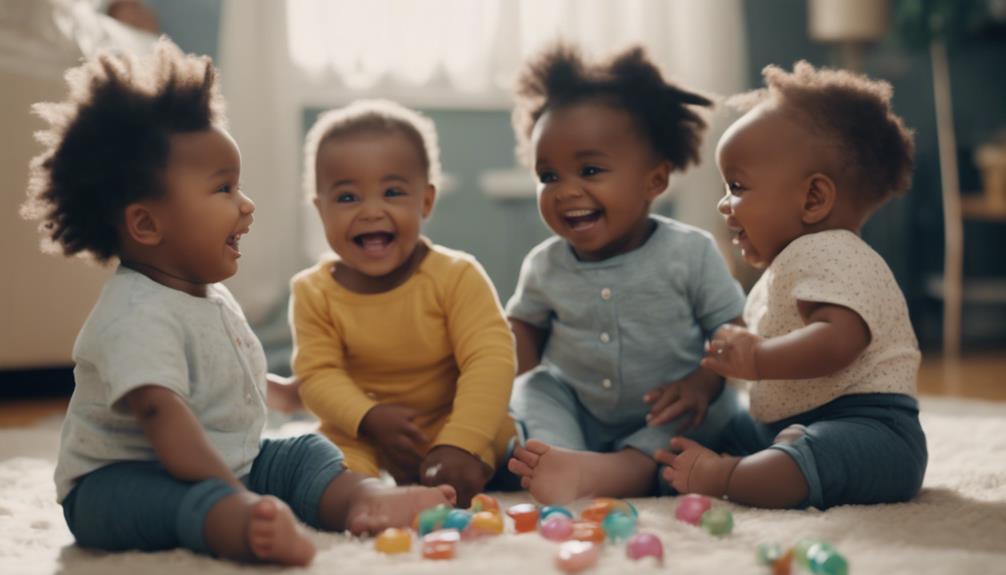Enhancing social interaction in early childhood is crucial for the development of cognitive and language skills in babies. Social interactions stimulate brain activity, which is directly related to improved language abilities. Teaching children to recognize and manage emotions helps to build emotional intelligence from a young age. Building strong bonds and establishing routines are important for creating secure attachments and fostering empathy. Encouraging independent play can stimulate creativity and problem-solving skills. Meaningful interactions with infants are essential for promoting language and cognitive development. Interacting with peers and practicing joint attention can boost social and communication abilities. Positive interactions, such as using parentese, can enhance children’s attention and language growth. Recognizing and supporting genuine engagement with infants is vital for improving their language skills and offers numerous benefits from early social interactions.
Key Takeaways
- Social interactions aid in language development and brain activity.
- Early emotional intelligence development shapes successful social interactions.
- Independent play fosters creativity, problem-solving, and cognitive development.
- Nurturing empathy and respect lead to kindness, cooperation, and positive social skills.
- Understanding social dynamics predicts future language skills and enhances learning.
Importance of Social Interaction
Social interaction plays an essential role in the development of language skills in babies, as evidenced by research emphasizing the significance of these connections. When adults engage in social interactions with infants, there's a noticeable increase in brain activity, particularly in attention-related regions. This heightened neural activity during these interactions is linked to enhanced language development in babies, as indicated by longitudinal study findings.
Brain-imaging technology like MEG has enabled researchers to monitor the changes in neural responses during adult-infant social interactions, shedding light on the impact of these engagements on language growth.
Moreover, parents' use of parentese, a form of speech characterized by higher pitch and exaggerated intonation, along with warm interactions, creates a social ensemble that positively influences babies' brain development and language skills. The natural back-and-forth exchanges between adults and infants provide a rich learning environment that fosters language acquisition and cognitive growth in babies.
Building Emotional Intelligence

When it comes to building emotional intelligence in babies, recognizing emotions in others plays a vital role. By observing and understanding different emotional cues, infants begin to grasp the intricacies of human feelings.
Managing personal emotions is equally significant, allowing babies to navigate social interactions and form strong relationships based on empathy and mutual understanding.
Recognizing Emotions in Others
Developing emotional intelligence in infants involves actively engaging in recognizing and responding to various emotional cues displayed by others during social interactions. Infants' attention to social ensembles triggers early brain reactions that contribute to their ability to recognize emotions in caregivers and other individuals.
Research indicates that infants as young as 6 months old exhibit brain activity during social interactions that demonstrate their capacity to detect emotional expressions. These early brain responses play a vital role in building emotional intelligence by laying the foundation for understanding and responding to emotions in others.
Managing Personal Emotions
To build emotional intelligence in infants, it's important to focus on teaching them how to manage their personal emotions effectively. Managing personal emotions involves recognizing and regulating feelings such as joy, sadness, anger, and fear.
By helping babies understand and control their emotions, they develop the foundation for emotional intelligence, which encompasses the ability to comprehend, express, and respond to feelings in a social context. Emotional intelligence in infants is vital as it sets the stage for successful social interactions and relationships in the future.
Encouraging emotional awareness in babies not only supports their overall well-being but also enhances their social skills. When babies learn to manage their personal emotions, they become more skilled at navigating social situations, understanding the emotions of others, and forming meaningful connections.
This early development of emotional intelligence lays a strong groundwork for healthy social interactions and positive relationships throughout their lives.
Building Strong Relationships
Developing a strong bond with babies is essential for nurturing their emotional intelligence and fostering healthy relationships. When it comes to building strong relationships with infants, there are key strategies to keep in mind:
- Respond Promptly: By promptly responding to a baby's cues, you show them that their needs are important, which fosters security and attachment.
- Engage in Interactive Activities: Interactive activities such as talking, singing, and playing are critical for enhancing social development and stimulating baby brain activity.
- Establish Routines: Creating routines and providing calm interactions not only help in maintaining a baby's attention but also contribute to their early development by promoting emotional connection and learning.
Encouraging Independent Play

Encourage your baby to engage in independent play to foster creativity and problem-solving skills. Independent play provides an important opportunity for infants to explore their surroundings freely, stimulating their brains and promoting cognitive development.
By allowing your baby to engage in self-directed play in a safe environment, you create a space where they can build confidence, independence, and a sense of autonomy. This type of play not only supports their growth but also helps them learn to entertain themselves, enhancing their problem-solving abilities.
Through independent play, babies can develop essential skills that will benefit them in social interactions and various aspects of their lives. Providing a secure environment for your baby to engage in independent play is essential for their overall development, as it encourages them to use their creativity and explore the world around them in a safe and nurturing way.
Nurturing Empathy and Respect

Trusting children to naturally develop manners and emotional regulation lays the foundation for nurturing empathy and respect.
Observing their innate capacities for respect and empathy underscores the significance of allowing interactions to unfold organically.
Encouraging authentic exchanges without imposing rigid social constructs such as sharing can greatly support the cultivation of essential social skills.
Building Empathy Skills
Fostering empathy in children involves nurturing their understanding and compassion towards others. When it comes to building empathy skills early on, engaging in positive social interactions plays a vital role. These interactions stimulate brain activity associated with empathy, helping children learn to recognize and understand emotions in themselves and others.
Encouraging empathy in children not only fosters kindness and cooperation but also enhances their ability to navigate conflicts with sensitivity and respect. By teaching empathy at a young age, individuals are more likely to grow into considerate and empathetic adults who value the feelings and perspectives of those around them. This foundation of empathy can lead to more positive social relationships and increased emotional intelligence, contributing to a more harmonious and understanding society overall.
Fostering Mutual Respect
Nurturing empathy and respect in children is vital for fostering mutual respect from an early age. When children learn to take into account others' feelings and perspectives, they begin to develop a sense of understanding and compassion towards those around them.
This early foundation plays an essential role in shaping positive social interactions as they grow. Studies have shown that encouraging empathy and respect in the early age period can have a significant impact on brain activity related to social interactions and language development.
Enhancing Social Connections

Enhancing social connections early on can greatly impact an infant's brain development and language skills later in life. Here are some key points to keep in mind:
- Social interactions boost baby's brain activity: Engaging with caregivers and peers stimulates neural pathways associated with attention, an essential skill for language acquisition.
- Increased neural activity during social engagements: Infants exhibit heightened brain responses during interactions with adults, indicating the importance of social stimuli in shaping neural development.
- Early social engagements predict language development: The importance of social interactions, including parentese and warm interactions, plays a significant role in laying the foundation for enhanced language skills in the future.
Understanding the significance of social connections in the early months can lead to improved language proficiency and cognitive abilities as infants grow.
Understanding Social Dynamics

Understanding the dynamics of social interactions between adults and babies is key to comprehending the impact on infant language development. Recent research employing a noninvasive brain-imaging technique called magnetoencephalography (MEG) has shed light on the correlation between social interactions and brain reactions in infants.
Studies have shown that increased neural activity in response to social interaction showed a direct link to enhanced language development later on. The University of Washington's I-LABS has highlighted the significance of social connections, particularly the use of parentese, in fostering infant language growth.
Long-term observations have indicated that early brain responses during social interactions can serve as predictors for future language skills in babies. By monitoring infant brain activity during social interactions, researchers can gain valuable insights into how these interactions contribute to language development, emphasizing the vital role that social dynamics play in shaping a child's linguistic abilities.
Facilitating Natural Learning

How can natural learning be facilitated to nurture children's innate social skills and interactions? Facilitating natural learning in children is important for fostering their social skills and interactions.
Here are three key strategies to help promote natural interaction and support social skill development:
- Encouraging Baby Brain Activity: Engage children in activities that stimulate their developing brains, such as interactive games, storytelling, and sensory play. These activities can enhance cognitive function and promote social interactions.
- Embracing Natural Interaction: Allow children the freedom to interact naturally with their peers without imposing adult concepts like sharing. By observing and acknowledging their innate capacities for respect and empathy, you can support the development of genuine social skills.
- Fostering Authentic Social Interactions: Create environments that encourage authentic interactions among children. By trusting them to develop manners and emotional regulation on their own, you can help them build essential social skills in a natural and meaningful way.
Supporting Social Skill Development

Social Play Benefits, Communication Building Activities, and Peer Interaction Strategies are essential components in supporting the development of social skills in infants.
Engaging in social play helps infants learn about turn-taking, sharing, and cooperation, laying a foundation for future social interactions.
Communication building activities, such as joint attention episodes and responding to infant cues, foster the development of language and social communication skills essential for forming connections with others.
Implementing peer interaction strategies, like facilitating parallel play and encouraging positive social behaviors, can enhance an infant's ability to navigate social situations and build relationships with peers.
Social Play Benefits
Engaging in social play with your baby can greatly support the development of their social skills. When you interact with your little one during playtime, you're laying a strong foundation for their future social interactions.
Here are three key benefits of social play for infants:
- Enhanced Brain Activity: Social interactions during play stimulate various areas of the brain, promoting cognitive development and helping babies understand emotions and social cues.
- Improved Language Development: Engaging in social play exposes babies to different sounds, words, and gestures, which can enhance their language skills and vocabulary acquisition.
- Fostered Emotional Development: Positive social engagement during play helps infants build trust, empathy, and emotional connections with others, setting the stage for healthy social relationships in the future.
Communication Building Activities
To further support your baby's social skill development, engaging in communication building activities is an essential way to enhance their interaction and learning abilities.
Interacting with your baby through games and conversations not only strengthens their social skills but also boosts their developing brain activity.
Reading books with a soft tone while pointing to words and images can greatly aid in language development, laying a strong foundation for future communication skills.
Encouraging your infant to imitate facial expressions in pictures and identifying emotions helps nurture their understanding of social cues and emotional intelligence.
Additionally, sharing beloved songs, and discussing the contents of pictures can enrich their language skills and promote positive social interactions.
Establishing routines for safety and forming secure attachments with primary caregivers are crucial aspects that contribute to your baby's social development.
These activities not only stimulate their baby brain activity but also foster healthy adult interactions, setting the stage for robust social interactions in the future.
Peer Interaction Strategies
Encouraging infants and young children to interact with their peers is essential for fostering social skill development. Here are three key strategies to support peer interaction and enhance social skill development:
- Social Play: Engaging children in social play activities such as group games, role-playing, and collaborative tasks can help them learn important social cues, turn-taking, and cooperation skills.
- Communication Skills: Encouraging children to interact with peers can enhance their communication skills through verbal and non-verbal exchanges, active listening, and expressing thoughts and emotions effectively.
- Emotional Regulation: Positive peer interactions provide opportunities for children to practice emotional regulation by learning to manage their feelings, understand others' perspectives, and develop empathy and problem-solving abilities.
Promoting Positive Interactions

Positive social interactions with your baby, such as using parentese and maintaining eye contact, are essential for enhancing their attention and engagement. Research has shown that these interactions trigger increased brain activity in infants, particularly during engagements with adults. This heightened neural response during social interactions plays a pivotal role in the development of language skills in infants.
The social ensemble constructed by parents, which includes using parentese, physical touch, and warm responses, plays a crucial role in infants' brain development. Moreover, early neural responses to social interactions at just 5 months of age can predict language growth in infants during later stages.
Benefits of Authentic Engagement

Engaging authentically with your baby in social interactions yields significant benefits for their language development and cognitive growth. Here are three key benefits of authentic engagement:
- Infants Develop Language Skills: Positive responses, eye contact, and smiles during interactions enhance attention and positively contribute to the baby's language development.
- Attention Enhances Cognitive Growth: Parentese, combined with warm responses, captures infants' attention, motivating learning and cognitive growth.
- Safe and Noninvasive Brain-Imaging: Studies using safe and noninvasive brain-imaging techniques have shown a direct link between early social interactions and future language skills in babies.
Understanding the importance of authentic engagement can help parents and educators support infants' language development effectively. By engaging authentically with your baby, you're laying a strong foundation for their linguistic abilities and cognitive advancement.
Frequently Asked Questions
Can Social Interaction Help Babies Learn Faster?
Yes, social interaction can help babies learn faster. Engaging with others stimulates brain activity, enhancing language development. Positive interactions and parentese encourage learning. Your responses to social engagement directly impact your language skills' future development.
What Are the Benefits of Social Interaction With Babies?
When you engage with babies socially, their brains light up, paving the way for improved attention and language skills. Your positive responses and interactions set the stage for enhanced communication and future language development.
How Do Social Interactions Influence Infant Brain Development and Learning?
Social interactions with babies influence brain development and learning by increasing neural activity, aiding in attention and language skills. Positive responses and warm interactions, like parentese, play an important role in fostering language development and capturing infants' attention.
How Does Social Interaction Help in the Learning of a Child?
Social interaction helps your child's learning by fostering brain development. Increased brain activity due to social engagement predicts better language skills. Your warm interactions, smiles, and touch create a social ensemble pivotal for your child's cognitive growth.
Conclusion
To sum up, research shows that babies who engage in social interactions experience numerous cognitive and emotional benefits. Studies have found that infants who engage in social play exhibit increased levels of empathy and emotional intelligence, ultimately leading to enhanced social connections and positive interactions.
According to a recent study by the American Academy of Pediatrics, babies who engage in regular social interactions are more likely to develop strong social skills and form meaningful relationships later in life.









